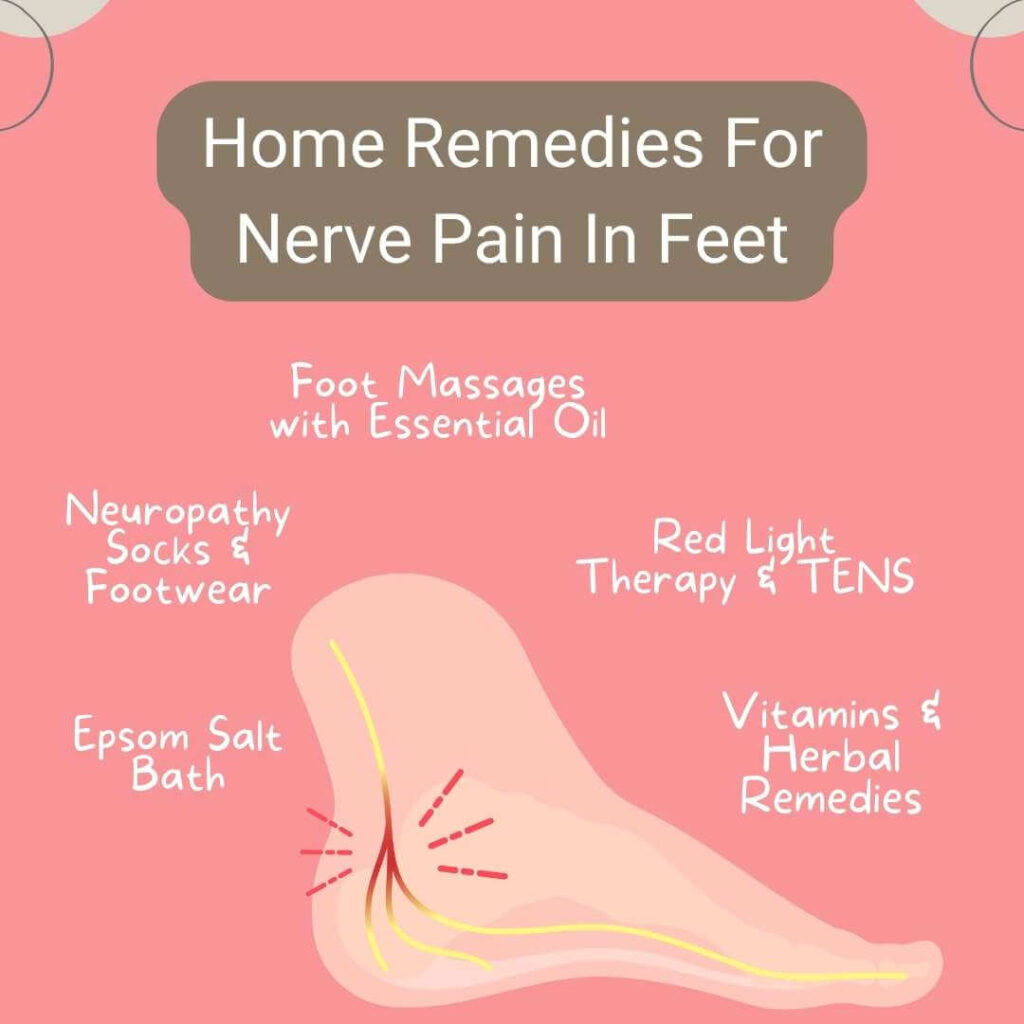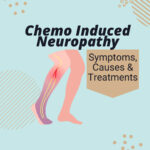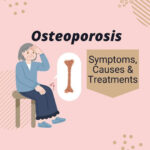Nerve pain in your feet could be a sign of a condition called peripheral neuropathy which is a chronic and progressive condition that affects the sensory and motor nerves in your feet, causing discomfort, numbness, and even pain signals to misfire.
Managing nerve pain in your feet requires a combination of self-care home treatments and medication. Simple remedies like foot exercises, warm foot soaks, and maintaining proper foot hygiene can help reduce discomfort.

Home Remedies for Treating Nerve Pain in the Feet
Epsom Salt Baths
One of the most effective home remedies for nerve pain in feet is soaking your feet in an Epsom salt bath. This can be highly beneficial in reducing inflammation and easing nerve pain. Epsom salt contains magnesium sulfate, which is known to have anti-inflammatory properties. Dissolve half a cup of Epsom salt in warm water in a basin or foot spa. Immerse your feet in the solution for 15-20 minutes, allowing the minerals to penetrate your skin and provide relief. Regular Epsom salt baths can help alleviate swelling, improve circulation, and minimize nerve pain associated with neuropathy.
Applying Warm Compresses
Another great remedy is applying warm compresses. The warmth helps to increase blood flow to the affected area, which can reduce pain and promote healing. To make a warm compress, soak a clean towel or washcloth in warm water. Wring out the excess water and then place the compress on your feet. You can leave it on for 10-15 minutes, repeating as necessary throughout the day. The soothing warmth will provide relief and comfort to your nerves.
Neuropathy Socks
Neuropathy socks are specially designed to provide relief for those suffering from nerve pain in their feet. These socks are made with materials that offer extra cushioning and support, helping to alleviate discomfort caused by neuropathy. They also promote better circulation, which can aid in reducing inflammation and pain. By wearing neuropathy socks regularly, you can improve comfort and mobility.
Regular Exercise for Improved Nerve Function
Engaging in regular exercise, such as walking or swimming, is another effective way to improve nerve function in the feet. Physical activity stimulates blood flow and promotes the release of endorphins – natural pain-relieving chemicals produced by the body. Walking or swimming also helps strengthen muscles, providing better support to your feet and reducing strain on your nerves. Aim for at least 30 minutes of exercise daily to reap these benefits.
Foot Massages with Essential Oils
Massaging your feet with essential oils like lavender or peppermint oil can offer relief from nerve pain. These oils have soothing properties that help relax tense muscles and calm irritated nerves. To give yourself a foot massage at home, mix a few drops of essential oil with a carrier oil like coconut oil or olive oil. Gently massage the mixture into your feet, focusing on the areas experiencing pain or discomfort.
Nonprescription Treatments for Nerve Pain in Feet
Let’s explore some of the most effective nonprescription treatments for foot neuropathy.
- Over-the-Counter Pain Relievers: Medications like acetaminophen and ibuprofen are commonly used to temporarily relieve nerve pain. They work by reducing inflammation and blocking certain chemicals in the body that transmit pain signals.
- Topical Creams Containing Capsaicin: Capsaicin is derived from chili peppers and has been shown to have analgesic properties. When applied to the affected areas of your feet, capsaicin creams can help reduce pain by desensitizing the nerves over time.
- Orthotic Inserts and Cushioned Footwear: Reducing pressure on sensitive nerves is crucial when managing foot neuropathy. One effective way to accomplish this is by using orthotic inserts or cushioned footwear. These products provide additional support and padding for your feet, helping distribute weight evenly and reducing pressure on specific areas.
- Red Light Therapy: A relatively new nonprescription treatment gaining popularity for nerve pain is red light therapy. This therapy involves exposing the affected areas of your feet to low-level red light, which penetrates the skin and stimulates cellular metabolism. Red light therapy has been shown to improve blood flow, reduce inflammation, and stimulate nerve regeneration. It offers a safe and painless way to address foot neuropathy symptoms without relying solely on medication.
- Transcutaneous Electrical Nerve Stimulation (TENS): Portable devices deliver low-level electrical currents through electrode pads placed on your skin. The electrical currents stimulate the nerves, effectively blocking pain signals from reaching your brain. TENS devices are easy to use and can be adjusted to different intensity levels based on your comfort level.
- Cold Therapy, also known as cryotherapy, can provide temporary relief by numbing painful areas and reducing inflammation in your feet. Using ice packs or cold compresses on the affected areas can help alleviate discomfort caused by foot neuropathy. Cold temperatures constrict blood vessels, reducing swelling and dulls nerve pain temporarily.
- Herbal remedies have long been used as natural alternatives for managing different health conditions. In the case of nerve pain in the feet, evening primrose oil is rich in gamma-linolenic acid (GLA), which possesses anti-inflammatory properties. GLA helps reduce inflammation associated with nerve damage and may alleviate foot neuropathy symptoms over time. Another herbal remedy worth considering is alpha-lipoic acid (ALA). This antioxidant not only protects nerves from oxidative stress but also promotes their regeneration.
Causes and Symptoms
There are several common causes and symptoms for nerve pain in feet.
- Diabetes: High blood sugar levels can cause damage to the nerves over time, leading to symptoms such as tingling, numbness, burning sensation, and muscle weakness. Read our article on diabetic neuropathy ICD-10 for more information.
- Vitamin deficiencies, particularly deficiencies in vitamins B1 (thiamine), B6 (pyridoxine), B12 (cobalamin), and E, can lead to nerve damage and subsequent pain symptoms.
- Alcohol abuse is another common cause of peripheral neuropathy as excessive alcohol consumption can harm nerve function.
- Certain medications may also have side effects that include peripheral neuropathy. Chemotherapy drugs used in cancer treatment are known for their potential to damage nerves. Some antibiotics and antiviral medications have been associated with peripheral neuropathy as well.
- Trauma and Injury: Accidents or sports-related injuries that impact the nerves may lead to the condition.
- Infections caused by certain viruses or bacteria can also affect the nerves and cause nerve pain in feet. Conditions like shingles (herpes zoster) or Lyme disease can lead to nerve pain in the feet. Autoimmune diseases such as rheumatoid arthritis and lupus may result in peripheral neuropathy as the immune system mistakenly attacks healthy nerve tissue.
Managing Underlying Medical Conditions
By addressing the root causes of the pain, you can not only find temporary relief but also work towards long-term healing.
- Proper Blood Sugar Control: High blood sugar levels can damage nerves over time, leading to pain and discomfort in the feet.
- Treating Vitamin Deficiencies: Incorporating foods rich in vitamin B12, B6, and D into your diet can also provide relief from nerve pain. Foods such as fish, eggs, dairy products, leafy greens, and fortified cereals are excellent sources of essential nutrients that support nerve health.
- By cutting back on alcohol consumption or eliminating it altogether and quitting smoking, you can improve blood circulation to the affected areas, reducing inflammation and providing relief from foot pain.
- Medication: In some cases, adjusting medications may be necessary to manage foot neuropathy symptoms effectively. If you experience persistent or worsening nerve pain in your feet, consult with a medical professional who can review your current medications and make any necessary adjustments.
The Role of Vitamins and Supplements in Relieving Nerve Pain
Vitamin B12
Supplementing with vitamin B12 has been shown to help alleviate symptoms associated with nerve damage. This water-soluble vitamin is involved in the production of myelin, a protective sheath that surrounds nerve fibers. By supporting myelin synthesis, vitamin B12 helps improve nerve conduction and may reduce pain, tingling, and numbness in the feet.
In addition to its role in myelin production, vitamin B12 also aids in DNA synthesis and red blood cell formation. These processes are vital for overall nerve health and function. If you have a deficiency in this essential nutrient, supplementing with vitamin B12 can provide much-needed relief from foot neuropathy symptoms.
Alpha-lipoic acid
Alpha-lipoic acid functions as both a fat-soluble and water-soluble antioxidant, allowing it to penetrate various tissues throughout the body. Its unique ability to neutralize free radicals makes it an excellent candidate for combating oxidative stress, which can contribute to nerve damage.
Research suggests that ALA supplementation may help improve blood flow to nerves and enhance their function. By reducing inflammation and oxidative stress, alpha-lipoic acid can potentially alleviate foot neuropathy symptoms such as burning pain or numbness.
While ALA can be found naturally in certain foods like spinach, broccoli, and organ meats, supplementation may be necessary to achieve therapeutic levels. Consult with your healthcare provider to determine the appropriate dosage and duration for your specific needs.
Vitamin D
Vitamin D plays a vital role in calcium absorption and bone health, but recent research suggests that vitamin D deficiency may also contribute to nerve damage. Natural sources of vitamin D include sunlight exposure and certain foods like fatty fish, fortified dairy products, and egg yolks.
Conclusion: Home Remedies for Nerve Pain in Feet
There are various home remedies for nerve pain in feet on the market that can help you find relief. Most people can manage peripheral neuropathy very well with these home remedies. However, working closely with your healthcare provider, particularly if symptoms worsen over time is highly recommended. In severe cases, prescription medicine may be necessary.
FAQs about Home Remedies for Nerve Pain in Feet
What are some lifestyle changes I can make to help alleviate nerve pain in my feet?
Maintaining a healthy weight through exercise and proper nutrition, avoiding excessive alcohol consumption or smoking which can exacerbate neuropathy symptoms, wearing comfortable shoes that provide adequate support and cushioning for your feet are great lifestyle changes to help with the condition.
Can I use essential oils to relieve nerve pain in my feet?
Yes, certain essential oils have properties that can help alleviate nerve pain. Peppermint oil, lavender oil, and chamomile oil are known for their analgesic and anti-inflammatory effects. You can dilute a few drops of these oils with a carrier oil like coconut or jojoba oil and massage the mixture onto your feet. However, it’s important to do a patch test first to ensure you don’t have any adverse reactions, and if you have sensitive skin or allergies, consult with a healthcare professional before using essential oils.
Are there any dietary changes I should consider to manage foot neuropathy?
A healthy diet can play a crucial role in managing foot neuropathy. Incorporate foods rich in B vitamins (such as leafy greens, whole grains, and legumes), omega-3 fatty acids (found in fatty fish like salmon or sardines), antioxidants (found in fruits and vegetables), and magnesium (found in nuts, seeds, and dark chocolate). These nutrients support nerve health and can potentially reduce inflammation associated with neuropathy. Consult with a nutritionist or healthcare professional for personalized dietary recommendations based on your specific needs.
Is it safe to take supplements for relieving nerve pain?
Supplements may be helpful for some individuals experiencing nerve pain; however, it’s important to consult with a healthcare professional before starting any new supplements. They can assess your specific condition and make appropriate recommendations. Supplements like alpha-lipoic acid, acetyl-L-carnitine, or B vitamins may be suggested to support nerve health and reduce neuropathy symptoms. Always follow the recommended dosage instructions, and inform your healthcare provider about any other medications you are taking to avoid potential interactions.
References
- How To Improve Gut Microbiome – 26 May 2024
- Chemo neuropathy treatment: What to do? – 19 May 2024
- How to Prevent Osteoporosis: Effective Strategies & Simple Steps – 28 December 2023





